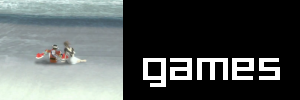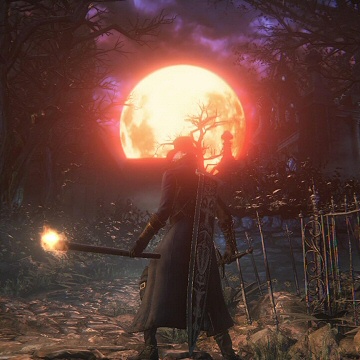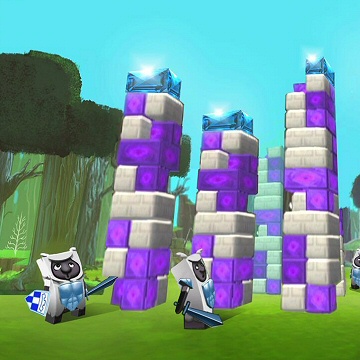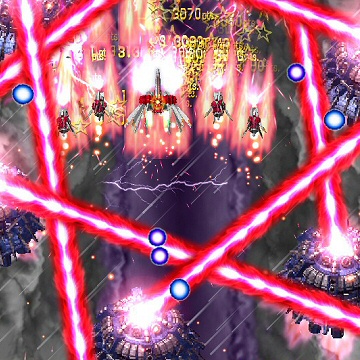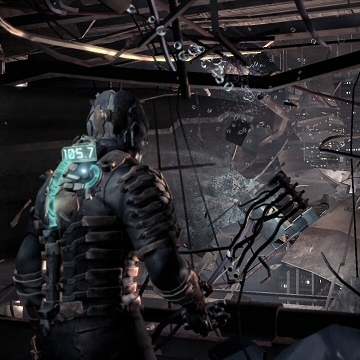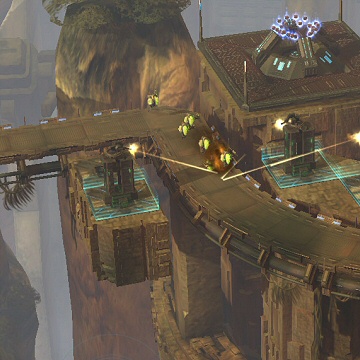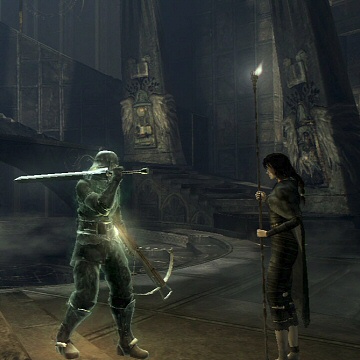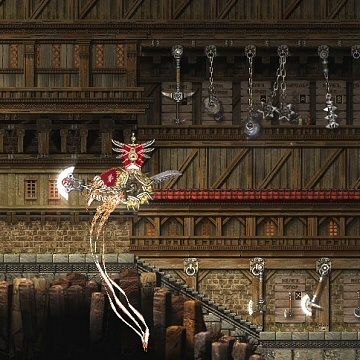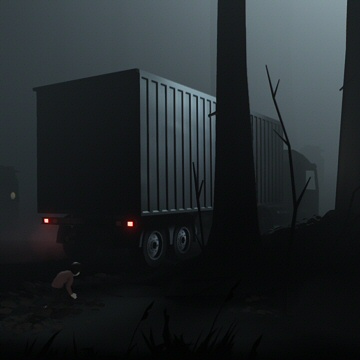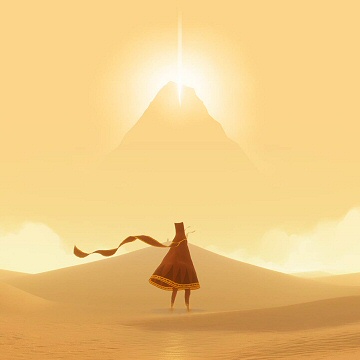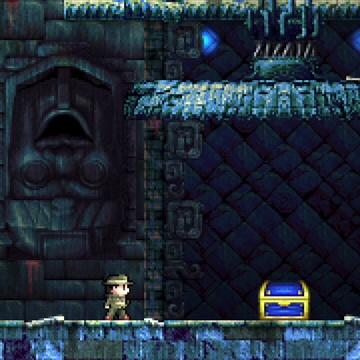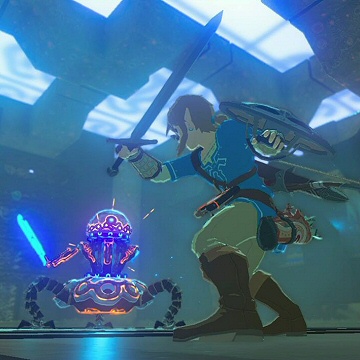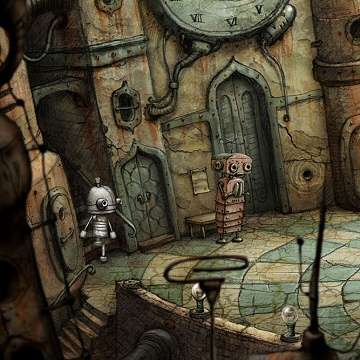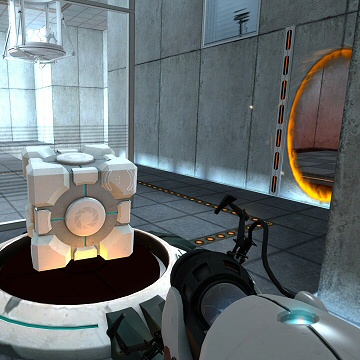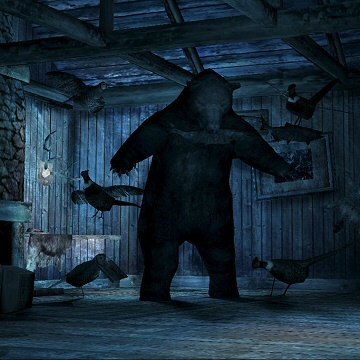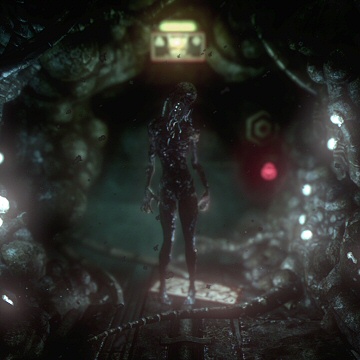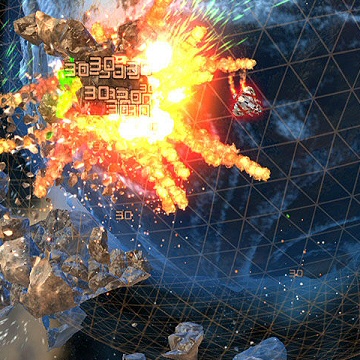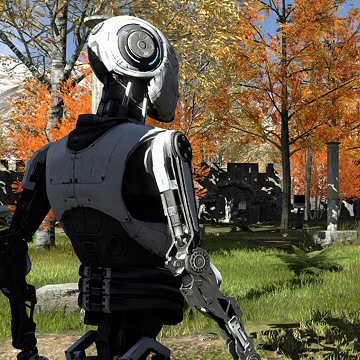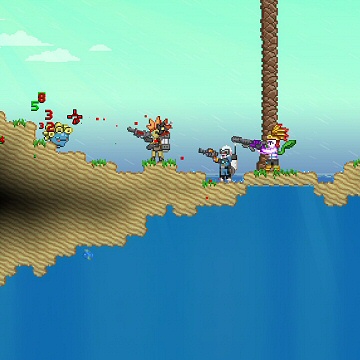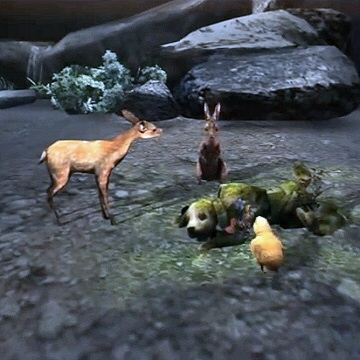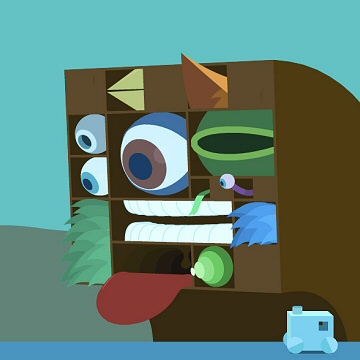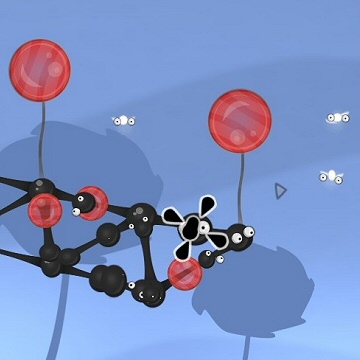Bloodborne
2015, PS4
Although mechanically similar to Demon's Souls and Dark Souls, Bloodborne has a unique world full of nightmarish imagery.
It's not difficult to find video games influenced by the works of H.P. Lovecraft, but one this impressive is rare.
Boom Blox
2008, Wii
I don't know that another title made better use of the Wii's motion controls than Steven Spielberg's Boom Blox. Among the many game modes are some excellent multiplayer competitive options.
Mark Mothersbaugh composed music for the soundtrack. I particularly like the songs that play in the block-sliding competitive game.
The sequel, Boom Blox Bash Party (2009), expands somewhat on the original game but differs in that you can't kill the animals in the background.
Crimzon Clover: World Ignition
2011, PC
Dispensing with story and characters, Crimzon Clover is focused, polished, and accessible despite its manic action.
The fourth stage is my favorite, with its music that reminds me of the "Wheel of Fortune" theme song.
Dead Space
2008, PC/PS3 (and other platforms)
Dead Space is a science fiction horror game with visceral action and environments that feel convincingly dangerous.
This game taught me that the song "Twinkle, Twinkle, Little Star" has more than one verse.
I also enjoyed the 2011 follow-up Dead Space 2. The third game quickly lost my interest, however.
Defense Grid: The Awakening
2008, PC (and other platforms)
Some of my favorite custom StarCraft maps were the "turret defense" ones. In the genre that has emerged since, one of the very best games I've come across is Defense Grid: The Awakening.
Other tower defense-style games I've enjoyed include Immortal Defense (2008), Plants vs. Zombies (2009), and (though it's a stretch) Creeper World 3 (2013).
Demon's Souls / Dark Souls
2008 / 2011, PS3
Demon's Souls features precise combat, a creative world, and a challenge that somehow manages to feel punishing and compelling at the same time.
Dark Souls deserves a separate entry in this list given my affection for it, and its two sequels are excellent as well. But I don't want to get too repetitive here.
The indirect multiplayer mode in these games is a big part of the appeal.
Hammerfight
2009, PC
Hammerfight is a physics-based game in which you pilot a steam-powered flying machine. Using the vehicle's inertia, you swing weapons to fight in arenas and story-based missions.
Hammerfight was created by just one person, but it's quite polished and entertaining.
Inside
2016, PC/PS4 (and other platforms)
A puzzle platformer with strong atmosphere, Inside dramatically improves on the developer's previous title Limbo (2010) while following a similar format.
Like Limbo, Inside has impressive sound design. Its soundtrack was recorded using a human skull.
Inside's surrealism increases as you progress, and the final sequence is quite memorable.
Journey
2012, PS3/PS4
Journey combines an evocative soundtrack, a mysterious, wordless story, and abstract visuals to offer a powerful experience.
Journey includes a subtle, anonymous multiplayer feature. I didn't realize initially that I was interacting with another human player.
La-Mulana
2011, Wii/PC
This is a remake of a the 2005 version of the game, which I watched but never played.
Some of the puzzles are totally unreasonable, but I suppose that's part of the game's charm and I didn't mind having to use a guide.
The Legend of Zelda: Breath of the Wild
2017, Wii U/Switch
I'd become somewhat disenchanted with Nintendo's first-party productions, but I'm glad that a friend insisted that I try Breath of the Wild. The game is impressive in every respect.
Machinarium
2009, PC/PS3 (and other platforms)
I was happy to see a full-length game by the creators of Samorost and The Quest for the Rest, and Machinarium exceeded whatever expectations I might have had. The art is appealing, the puzzles are clever, and the hint system is innovative.
Additionally, the game's music is outstanding. Also worth recommending is the music of Tomáš Dvorák (Floex) outside of video game soundtracks, such as the albums Pocustone and Zorya.
PixelJunk Shooter
2009, PS3, PS4 (and other platforms)
The two PixelJunk Shooter titles are now packaged as a single game. I find the blend of classic and modern elements compelling.
PixelJunk Eden is also worth a try.
Portal
2007, PC (and other platforms)
Portal is a first-person puzzle game that's notable for both its clever puzzles and its amusing writing (by the creators of Old Man Murray).
In 2007, fans of Portal created a set of new levels in a 2D Flash game. They then rebuilt those levels as a map pack for Portal itself. This stood as a sort of unofficial sequel until Portal 2 was released in 2011.
Silent Hill: Shattered Memories
2009, Wii (and other platforms)
A departure from the numbered Silent Hill games, but a good one. Scenes alternate between exploration, action, and therapy sessions. The game introduces major and minor variations based on your actions.
Highlights include a wheelchair sequence, a bridge sequence, and an appropriately dark rendition of "Always on My Mind."
The game's writer was Sam Barlow, who would go on to create Her Story in 2015. The sound designer was Matt Simmonds (a.k.a. 4mat).
SOMA
2015, PC/PS4 (and other platforms)
SOMA is a horror-themed game, but the monsters that occasionally chase you are tame compared to the relentlessly bleak science fiction narrative.
The nature of consciousness and personal identity are fascinating topics, and they are skillfully explored here.
As in the developer's 2010 title Amnesia: The Dark Descent (which I'd also recommend), you encounter dangerous entities and can draw their attention simply by looking at them.
Super Stardust HD
2007, PS3/PS4
Based on an Amiga game, Super Stardust HD is a twin-stick shooter in the style of Robotron 2084.
Another game of this type that I'd recommend is Geometry Wars 3 (2014).
The Talos Principle
2014, PC/PS4 (and other platforms)
While The Talos Principle is a laser diversion puzzle game at its core, it's also more than that.
The puzzles are varied and clever, and the allegorical story includes fun philosophical themes.
Terraria / Starbound
2011 / 2016, PC
I've spent a fair amount of time with Terraria (2011). Starbound is quite similar but gives you a universe to explore.
Building things is my favorite element of both games. I rarely find a game that I care to play online, but exploring and building with other players is a lot of fun in these games.
Tokyo Jungle
2012, PS3
Humans of the future attempt to escape their doomed world by instructing humans of the past to build a time travel device. The future humans secretly plan to replace the past humans, but the device malfunctions.
In the time that Tokyo Jungle takes place, no humans remain. But animals roam through the ruins of Tokyo, from chickens to dinosaurs. You attempt to survive as one of many species, Cubivore-style.
For a more complete account of the game's story, I recommend James Howell's article.
Windosill
2009, PC/iOS
Paul Eres called Windosill the best game on Steam, and it's hard to argue with that.
I appreciate when a video game includes mechanics that are simply fun to play with, independent of the goal of the game. Windosill is full of such things.
World of Goo
2008, Wii/PC/iOS (and other platforms)
An endearing puzzle game, World of Goo continually introduces new variations, colorful environments, and catchy music.
